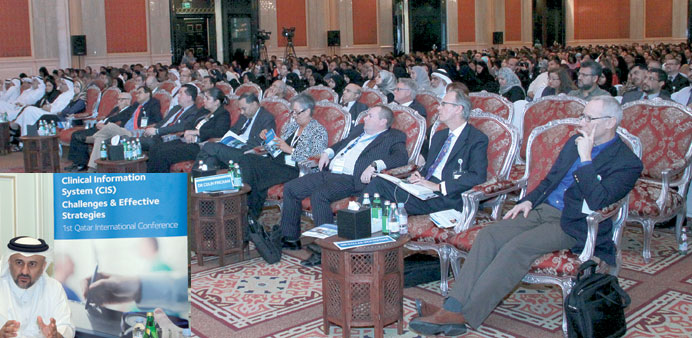By Noimot Olayiwola/Staff Reporter
A fully-automated healthcare information system with a single electronic health record (EHR) or a patient identifier will be launched across all Hamad Medical Corporation’s hospitals starting with Al Khor Hospital on January 1, 2014, a senior health official said yesterday.
“By the time the automated system goes live in January next year, all the patients’ paper records will be got rid of and a single patient identifier will be created to enable access to the eight hospitals under the HMC as well as all primary health centres (PHCs) in the country, HMC Clinical Information Systems Medical, Academic and Research Affairs deputy chief Dr Abdulwahab al-Musleh said .
“The integrated system – part of the overall clinical information system (CIS) – a procured enterprise system by the Hamad Medical Corporation (HMC) and the Primary Healthcare Corporation (PHCC), will first become active at the Al Khor Hospital, to be followed within three months by the Women’s Hospital, Hamad General Hospital, Dukhan Hospital and in parallel at a number of primary healthcare centres across the country,” al-Musleh said.
“Other hospitals and health centres will follow subsequently within a period of three months apart,” he told reporters on the sidelines of a one-day first Clinical Information System International Conference which was attended by more than 2,000 delegates.
The system, being implemented in phases over several years, is expected to cover all hospitals and PHCs by 2015 during which time another electronic system of documenting and retrieving patients data via mobile phones, iPad and other mobile platforms would also have been introduced.
He explained the implementation of electronic medical record (EMR) or CIS provided opportunities for collecting quality health data that could be shared with participating stakeholders, including patients, across the healthcare continuum, resulting in “predictive and personalised” medical service.
“All authorised clinical and non-clinical staff in PHCC and HMC will have access to a patient’s electronic record at their fingertips, thus having a full picture of his health, enabling them to make best clinical decisions,” al-Musleh maintained.
He said that HMC and PHCC were partnering in the implementation of CIS with support from system vendors Cerner Millennium and implementation experts Dell Services.
“We have also introduced other systems such as the 3M, which is the requirement by the Supreme Council of Health for coding and diagnostic grouping and reporting to the SCH: this is an achievement for both the HMC and PHCC because some countries in the region have been trying to implement coding - ICD9 (international classification of diseases) for the last 10 years and they have not been able to completely implement it in the government system. Here in HMC and PHCC we were able to do that in nine months.”
He said that HMC had also succeeded in using the most updated Australian version of coding diseases ICD10 in HMC hospitals through the 3M coding system and in the next three months they planned to extend it to all PHCs.
“Patients will benefit by implementing one of the most advanced clinical systems to improve their care and revolutionise the future of our care delivery. The new CIS means paperwork will be reduced in all areas, enabling clinical and non-clinical staff to spend more time with patients.”
Al-Musleh said the immediate availability of evidence-based and best-practice clinical content would help in selecting the appropriate treatment and thereby best outcomes.
“The Clinical Information System International Conference is a major milestone for us in supporting both organisations to get ready for this significant change in the way we work,” he noted, adding that the conference was part of the communication tools necessary to educate stakeholders about the system.
PHCC managing director Dr Mariam Abdul Malik said the corporation was committed to initiate and join other partners in delivering and maintaining the most efficient and sustainable healthcare for the public. “The PHCC’s successful collaboration with HMC is another sign of our commitment parallel to the National Health Strategy,” she said.
PHCC Clinical Affairs executive director Dr Juliet Ibrahim told Gulf Times that the CIS was not an end in itself but a tool to providing access to data.
“CIS is a tool that will provide real time access to data across different healthcare facilities with both HMC and the PHCC and it is also being envisaged to enhance integration of care as it will encompass computerising document entries, discovering medical and prescription errors as well as alert clinicians about allergies and other health problems that a patient might have,” she explained.

